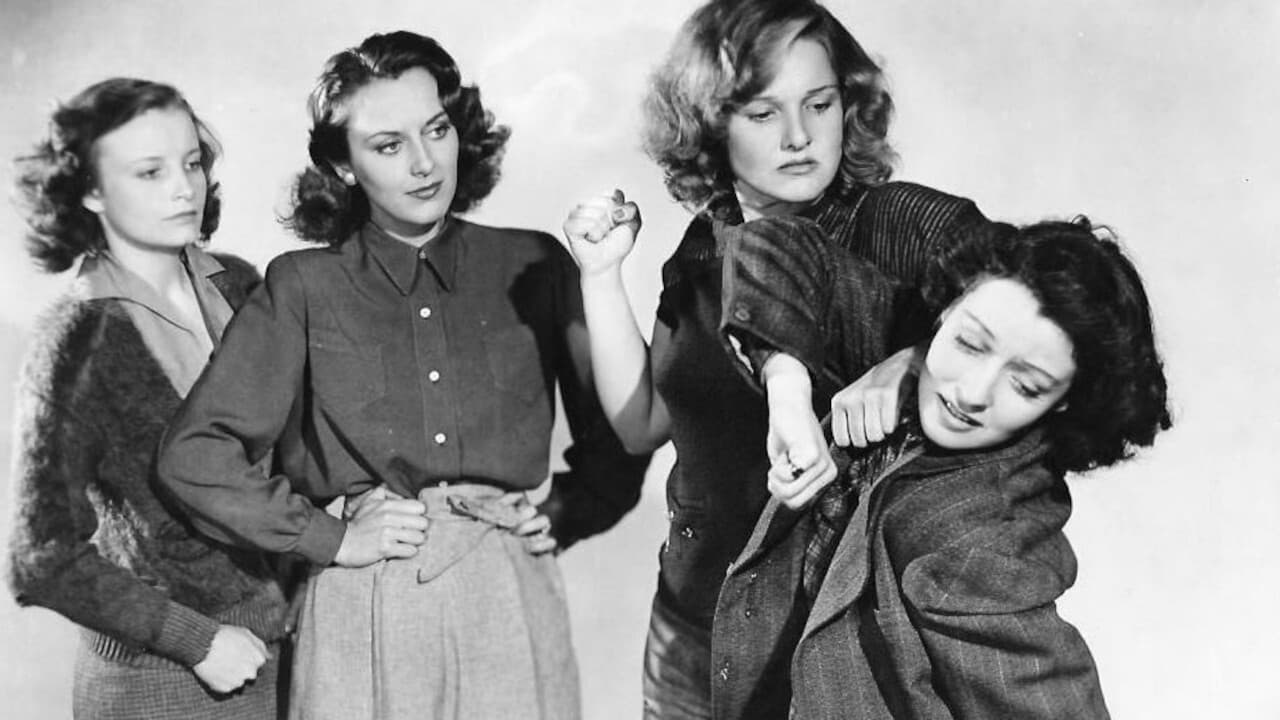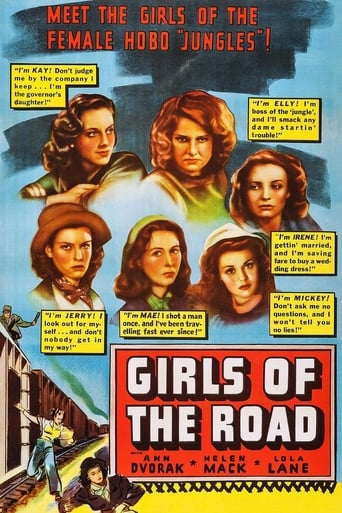Michael Morrison
In the city where this movie was made, where Columbia Pictures studio stood, where across the years probably millions of people have sought their dreams, in this year of A.D. 2018, anywhere from 40- to 60,000 people, men and women and children, are homeless.Because it is Los Angeles, one of the most corrupt and incompetently run cities in these United States, the homeless are both coddled and harassed by various government bodies.But genuine long-lasting help? Not in Los Angeles! One not so famous singer, with his own hands started building "tiny houses," giving them to homeless people of his acquaintance, and of course the city moved in garbage trucks and armed agents and stole at least three of them!Eventually they were returned, but with the solar cells missing!Private individuals and companies have donated land on which to erect the tiny homes and, again of course, have run into all kinds of bureaucratic obstacles. It is, to repeat, Los Angeles."Girls of the Road" was produced in one of the worst years of the Depression. After several years of the "New Deal," millions more people were out of work, tens of thousands more businesses had collapsed, and the Roosevelt administration, which had sought for answers in Italy, Germany, and Soviet Russia, had concluded only a war could save the situation. And, in the next year, got one.In this excellent movie, beautifully written, and superbly acted, desperate people exhibit the best and worst traits one would expect from people who have experienced the worst from other people.They have lost all dignity, and have had to beg for hand-outs since, being "road girls," no one will hire them for real jobs.One outsider sees a way, and, in this film, is well-enough connected to bring about a partial, and maybe temporary, solution.In modern life, governments have destroyed jobs and erected impossible obstacles for the creation of new jobs.Supposedly free human beings are required to carry government-issued cards embossed with government-issued numbers, without which those supposedly free human beings cannot even apply for jobs.And in many situations cannot even apply for hand-outs from allegedly Christian agencies.Helen Mack has long been one of my favorite actresses. Her performance in "The Milky Way" made me think she was perfect in comedy parts, but her performance in "Girls of the Road" showed me she is perfect in any role she wanted to play. She is powerful, mesmerizing, as "Mickey."Ann Dvorak is, as usual, also perfect. She was an elegant-looking lady, although she's also been perfect as much rougher characters, and she had a nearly musical voice, very noticeable in this role.Having some experience and knowledge of the current problems of homelessness, I was moved to tears by this movie, by the script as well as by the performances.Solutions to our problems are not be found in government -- please be sure to listen to what "the governor" says in the opening scenes. It accurately sums up why governments are not to be looked to for answers.Voluntary co-operation between and among individual human beings, caring human beings, perhaps working with voluntary organizations, including such loving and generous agencies as the Salvation Army, can, though, immensely lessen these kinds of human problems, sometimes known as "societal problems." But they are not "societal." They are human.Please do watch "Girls of the Road." Remember the context, the worst years of the Great Depression, and try not to let the too-dark print at YouTube prevent your seeing what great drama and, at the same time, what a great message of hope is presented.
kidboots
Just through being her usual feisty self and trying to fight for better pay and parts Ann Dvorak found she wasn't at the top for very long. But with her luminous, compelling talent she made sure whatever the movie (even the most unentertaining Perry Mason) - she was going to make her role stand out. "Girls of the Road" was her last American movie for a while - she went to Britain with her husband Leslie Fenton, enrolled in the Woman's Land Army and drove an ambulance during the war.Beautiful Kay Warren (Dvorak), the Governor's daughter decides to go undercover to try to help and expose what is a huge, topical problem - runaway girls, who become road hobos and face rape and worse through life on the road. She almost ends up as a statistic on her first ride with an over fresh salesman and eventually teams up with Mickey (Helen Mack) a tough veteran of the roads (but of course with a heart of gold)!!! Kay finds life grim on the road, constantly being forced to move on, being incarcerated where they have the indignity of being hosed, then ridden out of town on a rail. With women hungry hobos leering out of the freight cars, it is fraught with danger and Mickey, who may have had an unpleasant experience is fearful, and determined not to ride. Every girl has a story - Irene is hitching across country to marry her fiancée, she opted to buy a wedding dress rather than pay for a train ticket, another wants to be a beautician. There's always a head girl - in this case it's Ellie (Lola Lane sure looks and acts tough!!!). She runs the makeshift camp where they all end up and although she doesn't exactly say "I'm the boss of this jungle - and I'll smack any dame starting trouble" (like it says on the poster) you could imagine her saying it.The film reaches a climax with the death of one of the girls. Kay manages to alert her father with the help of a kindly lorry driver. I don't know about the comparisons with "Wild Boys of the Road" - that was a very confronting, early Warners "social problem" movie. You just know, in this movie that nothing too awful is going to happen to these girls - it might muss their hair or smudge their lipstick. In one scene involving a caring policeman (Bruce Bennett in a small part) Kay looks stunning in a turban and smart matching outfit, she wouldn't have looked out of place at the Ritz - considering the scene before had them jumping from a moving train.Helen Mack had had a productive career during the 30s, most of her movies carried a big emotional crying scene but "Girls of the Road" saw her almost at the end of her career. Lola Lane started out in early movie musicals ("Let's Go Places", "Good News") then become one of the Lane Sisters (she wasn't really) for the "Four Daughters" series. This movie may have given Ann Doran one of the few parts she could really do something with. She is so recognizable but was rarely a featured player. In this film she plays the girl who steals the wedding dress.Recommended.
howdymax
While it's true this movie is badly dated, I still think is worthwhile as a snapshot in time.Made in 1940, it chronicles the experiences of a group of wandering hobo woman caught in the economic grinder of the depression. I think it's valuable, because most of us - even us ancianos - have little conception of how desperate and depressing things were back in those days.The movie stars Ann Dvorak, Helen Mack, and Lola Lane, with a very competent supporting cast including Ann Doran and Mary Field. Ann Dvorak's performance especially stands out and reminds me of what an underrated actress she really was. While many of the others overact - I guess we can blame the director for a lot of that - her performance is understated and perfectly believable. But even though the production is theatrical and a little overdone, there are still nuggets of real emotion if you look for them. An expression, a tear in the eye, a quivering voice. Not what I would have expected in a melodrama like this.This movie makes a sincere attempt to deal with, what was a real contemporary problem back when it was made, and although we have our own problems to deal with today, looking back in history is always a good way to keep from repeating it. Take a look.
bkoganbing
Girls Of The Road finds Ann Dvorak as the daughter of the governor of some unnamed state going on the road incognito to get a look at conditions for women who are homeless. Dvorak takes an interest in her father's work and Governor Howard Hickman has just received a confidential investigative report about conditions for women in that situation. What Dvorak does, almost on impulse, is to hit the road herself and see first hand.She falls in with Helen Mack and in turn with others, in the end in a sort of makeshift camp that's run by tough girl Lola Lane. Dvorak sees the problems the women have, the varied situations they come from that have led them to this vagabond existence.Not the least of the problem is that the male of species is looked upon as a predator in many situations shown here. The unspoken lesbianism of the women is also quite clear, especially in Lola Lane's character.There is one death among the women in the film and I won't say which of the characters dies, but the scene is quite moving. I think if you see the film you'll be able to pick out which character it is.The obvious comparisons to make with this is with Warner Brothers Wild Boys Of The Road made seven years earlier. This one doesn't quite have the productions values that the Warner Brothers product did. This was strictly a product of Columbia's B picture unit and this kind of socially significant film had been passé for some time in Hollywood.Still Girls Of The Road does have its merits and is a most curious product of the times.

